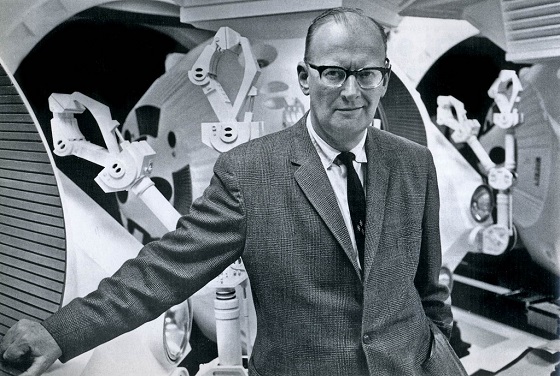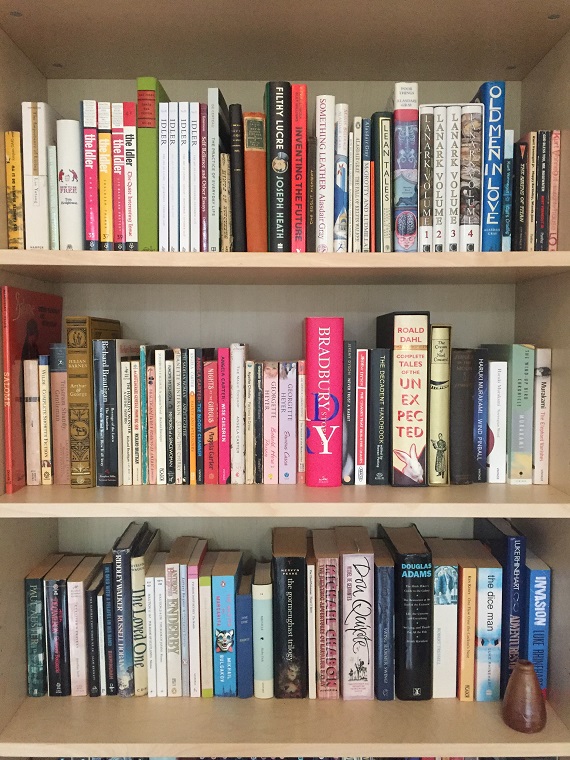An Escapologist’s Diary. Part 48. Artists’ Colony.
We’ve moved again. Such is the life of an Escapologist. Escape is mobility.
You may remember that we returned to Scotland from Canada and, very fortunately, were able to rent a flat quite cheaply from a friend who, making her own great escape, had left her home for pastures new. “Do you want a tenant?” I asked. For over a year we enjoyed a fine Escapological economy, our rent funding a friend’s escape and her property providing us with a hassle- and paperwork-free landing pad.
Well this was always going to be temporary. We wanted a better-situated HQ and our landlady would make more money renting her flat to real people instead of her slacker pals. So two months ago we moved to Hyndland, a part of Glasgow which, Wikipedia boasts, is home to “young bourgeois bohemians including a number of noted authors, poets, actors and footballers.”
I don’t know if I’d describe a footballer as a bourgeois bohemian (I suspect this is the result of two edits, footballers being tacked on by someone, perhaps a Hyndland estate agent, who doesn’t know what is meant by bourgeois bohemia) but you get the idea.
It’s quite posh in a tumble-down, half-reclaimed-by-nature sort of way and our neighbours all seem to be couples who, despite low incomes, won’t tolerate discomfort and ugliness. Suits us.


Almost as soon as we moved in, friend Landis came over from Chicago to live in our spare room for a couple of months. It’s been like having a pet artist. He sits at his drafting table all day long, feverishly cross-hatching and coming out, bleary-eyed, for a snack every full moon or so.
It’s been great having Landis over and our home has felt like a little artists’ colony, with he and Samara drawing and me writing at my laptop and something spicy simmering away on the kitchen stove. Not bad. Every now and then we get together and ad-lib a little project like this podcast about notebooks. We look like this:

When we moved in, all we owned was eight boxes of books and clothes, and three small pieces of furniture: even less than in our last move. The flat was unfurnished, so we had to place orders at Ikea and spend some time mooning around in thrift shops. This is all fairly contrary to my nature, so I’ve tried to see it as a creative venture — making something — rather than simply an acquisitive one.
We’ve been guided by minimalism — Is this thing necessary? How few bookshelves can we get away with? Shall we jettison these? — in an act of what in fact is a considerable expansion to our total mass.
This is a good lesson. Even in acquisition (especially in acquisition) be guided by minimalism. Also, “minimal” is relative to your needs. Just don’t kid yourself about your “needs”.
Having Landis over has been helpful in these early weeks, as he’s been able to help build our flatpacks. In fact, the whole move as been a barn-raising exercise with friends coming over to help with bits and bobs. This is nice not just in that it makes the process easier — many hands, light work — but also in that it imbues a corner of the flat with a memory. The bathroom door is now the door Alan sanded down for us. The futon is the futon Neil helped us to build. The sofa was put together by Peter and Sam. etc.
In other news, the Patreon campaign is going fairly well but perhaps not as well as I’d hoped. I think we’ll be okay but I do need more people on board. Dig deep, if you can, and subscribe to the new essay series for as little as £1.
A funny postcard arrives in the mail this morning from Sam’s parents in Canada, depicting scenes of toque-hatted Montrealers trudging through the grey slush and snowmobiles ploughing through the streets. I am so glad to be in Glasgow right now! But bless you, Canada.
★ The post-print phase of New Escapologist is just beginning. Go here to join in.
★ You can also buy all thirteen issues in print or PDF (in newly discounted £20 bargain bundles) at the shop.
Sealand
From a 2012 obituary of one Paddy Roy Bates, self-declared Prince of an offshore fort called Sealand:
Rejecting a British order to leave, he proclaimed the fort the Principality of Sealand, declaring himself Prince Roy and his wife, Joan, as princess.
The 550-square-metre (5,920-square-foot) fort [consisting of] two concrete towers connected by an iron platform claimed to be the world’s smallest sovereign state, though it was not internationally recognized.
Since an initial attempt to reclaim the fort was rejected by an English court, Britain has largely ignored the breakaway platform.
Despite the lack of legal status, Bates gave Sealand its own constitution, red, white and black flag, passports, stamps, coins, national anthem and a motto, E Mare Libertas: “From the sea, freedom”.
Today, Sealand makes money by selling aristocratic titles and hosting Internet servers.
Sealand is indeed a real place to this day. They even have an official website. Wonderful madness.
The site has a governmental look to it, betrayed by the occasional quirk or informality of language. Here’s a passage from the site about Sealand’s history:
In 1966 Roy Bates a former infantry major in the first battalion Royal Fusiliers whose regimental headquarters strangely enough was the “Tower of London” decided to take over the fortress. It was Christmas Eve 1966.
Roy smarting from a legal battle with the British government over his offshore radio station “Radio Essex” which had broadcast from another abandoned fortress that was found by the British courts to be within UK jurisdiction. These stations were known affectionately by the press as “Pirate” radio stations and were much loved by the British public as they supplied everything that the BBC did not at the time, Pop music and amusing presenters.Roy never did bring his radio station back to life but instead after taking much advice from his lawyers had the idea to declare this fortress island the independent state of “Sealand”. Claiming “Jus Gentium” over a part of the globe that was Terra Nullius.
2nd of September 1967 along with his son Michael (14), daughter Penelope (16) and several friends and followers Roy declared The Principality of Sealand raising a newly designed flag and making his beautiful wife “Princess Joan”. It was her birthday and Roy gave her the best and most romantic present he could think of the title of Princess.
On their page selling aristocratic titles, it reminds potentials Lords, Ladies and Barons, to check their junk mail folder after the transaction. Again, wonderful madness and great potential for a Christopher Guest film.
Paddy’s son, Prince Michael, has a book out, telling of “the truth behind Michael’s kidnap by armed terrorists, his family setting up their own island nation, government sieges, top secret government documents and multiple attempts to bring an end to the Sealand dream.”
I was tempted to do a similar thing for a moment: to begin a search for an abandoned oil rig or similar and to declare it an international liberty zone for Escapologists. But look at Michael’s adventures — too much like hard work, I fear.
“I might die young or I might die old, but I will never die of boredom,” [Paddy Roy] Bates said in a 1980s interview.
★ The post-print phase of New Escapologist is just beginning. Go here to join in.
★ You can also buy all thirteen issues in print or PDF (in newly discounted £20 bargain bundles) at the shop.
It’s the Most Wonderful Time of the Fiscal Year
For a winter chill, run a Google image search for “office Christmas decoration”. Brrr.



My personal favourite:

★ The post-print phase of New Escapologist is just beginning. Go here to join in.
★ You can also buy all thirteen issues in print or PDF (in newly discounted £20 bargain bundles) at the shop.
Arthur C. Clarke
Today marks the birthday of Arthur C. Clarke, who once said “the future of work is full unemployment.”

★ The post-print phase of New Escapologist is just beginning. Go here to join in.
★ You can also buy all thirteen issues in print or PDF (in newly discounted £20 bargain bundles) at the shop.
Letters to the Editor: The Escape is (almost) Complete
To send a letter to the editor, simply write in. You’ll get a reply and we’ll anonymise any blogged version.

Hi Robert,
Next Wednesday is my wife’s last day of work down at [Evil Corp], and quite possibly her last day of work, period.
She has committed to taking a minimum of one full year off, and in the new year will join me at the trading desk, aka our kitchen counter. I predict with some confidence that this will be the permanent end of work for both of us, because we have set things up to be on an even keel, expense-wise.
Because my wife has been working, it only felt like we’d half made it [after my own escape], but with the pending end of her contract I suddenly realized “holy shit, we actually did it”. It opens up some real possibilities, and now we get to settle in, take stock, and figure out better ways to use our time. Exciting times!
I think it’s important for people to know that they don’t have to figure everything out at the start. Our escape to freedom took shape over the course of several years (we started in earnest back in 2012), and a lot of scheming, planning, and effort has gone into making this a reality. Although we didn’t have a detailed plan in the beginning, and we didn’t have all the answers, we had a very strong sense of where we wanted to be. So my advice to readers is to keep that desired situation front and centre, and just keep plugging away at it, regularly reevaluating their situation and asking “where am I? where do I want to be? what is the next step?”
Personally, I feel quite vindicated, because along the way there were doubters and naysayers, and there were even times when self-doubt crept in. But I must also give credit where credit is due, and I’d like to extend a heartfelt “Thanks!” to New Escapologist. The interactions I’ve had with you, and the many thoughts provoked by your blog, magazine, and book have acted as a sounding board and shaping influence, and have above all lent a certain legitimacy to what we were already sensing. I really mean that. We owe you a debt of gratitude.
Keep doing what you do, Rob. It’s a good message.
Cheers,
L
Rob writes: Excellent news. Sounds like the strife is almost over. A year is a good amount of time to take off. Maybe your partner won’t like it and will want to go back to work, but maybe she’ll love it. It’s a choice, which is different from having to work. Either way, that’s the end of it. You’ve fled The Trap.
Thanks for the encouragement there too. I’ve been thinking carefully about what to do next with New Escapologist and have been close to shutting up shop, wanting to concentrate on other writing. That’d be a shame though, wouldn’t it? So I think I’ll keep plugging away at the message albeit in the more modest forms of the online essay series and the blog. Feeling fairly buoyed about it.
★ The post-print phase of New Escapologist is just beginning. Go here to join in.
★ You can also buy all thirteen issues in print or PDF (in newly discounted £20 bargain bundles) at the shop.
A Magic Show, a Lecture, and an Escape
The Patreon campaign inches ever forward. I’m proud of what’s already been achieved, but perhaps I’d hoped to be further along by now. Come on folks, join the party by subscribing to the new essay series for as little as £1.
Maybe I should give you some more info about what the essays will look like. Generally speaking, they’ll follow this structure:
First third: Personal intro (anecdotal, entertaining, a set up to the problem)
Second third: Theory section (history, philosophy, precidents)
Third third: Practicalities (solution, how to apply this philosophy to escapological life)
It approximately follows the format of Houdini’s later shows. He’d stage three different acts in one night: a magic show, a lecture, and an escape.
Each will be something in the region of 2,000 words: more substantial than a mere column but a little more easy-going than an Aeon article or a Guardian long read.
I’ve not yet decided (sloppy, I know, as this is important) whether the essay should be, quite literally, a subscription series where only the patrons are given the essay in a simple pay-for-content transaction OR if the essay should be posted publicly, Raptitude-style, with an honor roll of patrons and maybe some extra content for them. Patrons would be funding the project for the good of everyone, but maybe this isn’t fair and if you’re paying then perhaps you have right to be in an exclusive club. Please let me know (by email or by leaving a comment below) if you have feelings in either direction.
I’m already working on the first essays and I’m very proud of what I’ve written so far. Entertaining, researched and practicable if I say so myself. It might be the best Escapological writing I’ve managed to date, possibly because it comes after useful feedback from the book and possibly because I’d be quite embarrassed not to give the patrons something for their money.
So, yes, I’m rattling the can again — by which I mean asking for money more than shaking my bottom, though if you’d like to see the latter it can probably be arranged, perhaps as an exclusive bonus for patrons. If the essay series sounds good to you, please join us at Patreon. If you know someone who you think might benefit from the essays or are simply into making things happen with the magic of crowdfunding, please let them know about the project too.
Together we will conquer the world! Or, you know, make it a little bit nicer.
★ The post-print phase of New Escapologist is just beginning. Go here to join in.
★ You can also buy all thirteen issues in print or PDF (in newly discounted £20 bargain bundles) at the shop.
Fuck Work
Shitty jobs for everyone won’t solve any social problems we now face.
Every now and again, a really good essay comes up to support our way of thinking in a generally mainstream and acceptable way. It’s usually written by an academic or someone else broadly respectable, not shouting from the fringe as we do from New Escapologist. I’m thinking of David Graeber’s On the Phenomenon of Bullshit Jobs, Tim Kreider’s The Busy Trap and (if this doesn’t stretch the definition of ‘essay’ too far) Alex Williams and Nick Srnicek’s Inventing the Future. They capture if not the popular imagination then at least that of the trend-makers, which is why journalists have started asking me about automation and the crisis in work — because, at last, they’ve heard about it. We’re knocking on the door of mainstream discourse now and that is very, very encouraging. We must question the work ethic at every opportunity, and thanks to these big shouts, it’s now easier and more acceptible to do so.
Anyway, a likely new addition has made it into this canon of essays in the form of the irreverently-titled Fuck Work by James Livingston.
what comes after work? What would you do without your job as the external discipline that organises your waking life – as the social imperative that gets you up and on your way to the factory, the office, the store, the warehouse, the restaurant, wherever you work and, no matter how much you hate it, keeps you coming back? What would you do if you didn’t have to work to receive an income?
Arranging something like UBI is quite easy, he says, and a lot of the naysaying is precisely what it sounds like — naysaying. The real problem, he says, is a moral one: the problems of smashing the work ethic and replacing it with something else.
We’ve placed so many bets on the social, cultural and ethical import of work that when the labour market fails, as it so spectacularly has, we’re at a loss to explain what happened, or to orient ourselves to a different set of meanings for work and for markets.
the impending end of work raises the most fundamental questions about what it means to be human. To begin with, what purposes could we choose if the job – economic necessity – didn’t consume most of our waking hours and creative energies? What evident yet unknown possibilities would then appear? How would human nature itself change as the ancient, aristocratic privilege of leisure becomes the birthright of human beings as such?
It’s a good essay. Lots of economic and moral thought has gone into it. Read the whole thing here.
★ The post-print phase of New Escapologist is just beginning. Go here to join in.
★ You can also buy all thirteen issues in print or PDF (in newly discounted £20 bargain bundles) at the shop.
An Escapologist’s Diary. Part 47. Extemporale Zone

A weekend break in Berlin to celebrate my birthday and to give Canadian Samara some long-promised time on a larger land mass than the tiny island we now live on.
My third time in Berlin, this was a leisurely trip spent largely sitting around and masticating. She sure doesn’t bring this up often (like every day or anything) but Samara comes from a land of great grub and has moved to a land of decidedly sub-par food just to be with me. Gastronomic tourism is my little way of making amends.
We took an AirBNB in Kreuzberg, my favourite neighbourhood of Berlin, and took refuge from the cold at various bobo-friendly restaurants and bars.
My favourite place to eat wasn’t a resto at all but a marketplace. It was an indoor market hall where you can buy sandwiches for €3 and great coffee for €2 and eat and drink at various little public tables, watching the world go by. Intergenerational groups of locals did the same, enjoying small glasses of wine in the leisurely fashion not quite embraced by the Calvinists of Scotland and England. This being a market hall, I was also able to enjoy the presence of gigantic German sausages. I didn’t know where to look.

On Saturday we visited the museum at Bauhaus archive. We love Bauhaus (who doesn’t?) and it fits in nicely with our current line of thinking about artistic production (social, art-meets-utility, minimalist).
Leaving the building, we spotted this stone tablet (above) declaring an “Extemporale Zone” (or “out-of-time zone”) in which “the representation of eternity in every instant is the uniting sound before utopia”.

On Sunday I had to meet a journalist from Die Welt to be profiled for the newspaper with regards to my book, Ich Bin Raus. I think the journalist was largely on board, though we had limited time together so I probably just yelped something about escapology and hoped for the best.
As with other journalists I’ve met lately she asked about automation and the coming crisis in the nature of work, which is clearly a big topic at the moment and one I could talk about for a long time. Ultimately, I think we have to choose as a society between something approaching socialism (UBI) and the ultimate expression of neoliberalism (widespread precariat struggle) and I think I was able to communicate this in the time we had.
Monday morning and we touch down in Glasgow, ever-so-slightly larger. Burp.
★ The post-print phase of New Escapologist is just beginning. Go here to join in.
★ You can also buy all thirteen issues in print or PDF (in newly discounted £20 bargain bundles) at the shop.
Literarisches Sixpack

Here’s a post from a German book blog where they ask authors to name six of their favourite books in a feature called “Literarisches Sixpack”.
When asked to take part, I chose (predictably) At the Existentialist Cafe by Sarah Bakewell, How to be Free by Tom Hodgkinson, Among the Bohemians by Virginia Nicholson and three others I’ll let you discover for yourself.
The introductory text at this blog is in German but my book reviews are all in English. Warning: contains shamefully vain publicity photographs of yours truly.
On a not-unrelated note, a few people have asked if there’s a bibliography to Escape Everything! or Ich Bin Raus. There is. It’s here. Warning: contains an adorable photograph of a cute kitten.
Yes, the above photograph is a shelfie, taken this morning here in Escape Towers simply to illustrate this tiny blog entry about books. If you’re bored or just enjoy looking at bookshelves, see how many of the sixpack and/or bibliography books you can spot.
★ The post-print phase of New Escapologist is just beginning. Go here to join in.
★ You can also buy all thirteen issues in print or PDF (in newly discounted £20 bargain bundles) at the shop.
Affective Forecasting

It was one of the most boring weeks of my life. I was just dusting dirt off broken bits of brown tiles
Thus spake someone whose ambition it was to become an archaeologist. The quote is from a BBC news item reporting that “dream jobs” are often anything but. We should be careful what we wish for, the article says, because we don’t really know what these so-called dream jobs involve (or even, really, what we’re looking for in them).
The piece begins with a complaint from one such dream jobber who, always wanting to work with animals, landed a job at a Tasmanian animal sanctuary and found her days filled with depressing and menial tasks:
the reality of the work was quite different to what I had imagined. Instead of spending time each day getting to understand the animals and learn about them, I spent eight-hour days running between duties in the icy, winter rain, doing manual, sometimes heartbreaking, work. Many of the animals, such as Tasmanian devils and quolls, had been hit by cars and needed rehabilitation. I fed them, cared for them, avoided getting bitten — especially at meal times — and cleaned up after them. And, when they didn’t survive, we buried them and felt their loss. The work also extended beyond animal care; one of my tasks was to clean the public toilets. Was it my dream job? No.
It’s strange how people so often fail to imagine the attendant duties of a job promising to provide financial security, closeness to animals or a fancy hat. As I’ve said before, just because you like cakes doesn’t mean you’d enjoy running a bakery.
Could this even be the whole reason jobs are held in such high esteem? If we can’t even predict the misery that will come from taking the bait ourselves, perhaps we also think that landing the dream job, either through arduous job hunting or a logical career progression, is the finest solution available for everyone else too.
The unsatisfied animal lover continues:
my experience was more common than you’d think. It turns out, we often fail to think about the tedious minutia that is likely to be involved in what we consider to be our ideal job and how it might fall short of our expectations. In fact, psychologists even have a name for it: “affective forecasting”. What this means is we often have an unrealistic hopefulness that new situations will make us feel significantly different in a grass-is-always-greener mentality.
Affective forecasting is an interesting concept—that we consistently fail to predict the future scenario most likely to result in happiness—but the dissatisfaction experienced having arrived at a dream job, I’m afraid, is not an example of it.
The reason we might come hate a dream job is not because it once looked like greener grass but because it’s a job. The whole idea of a job being a source of happiness is a lie.
Even if the central activity of a job is splendid (which it rarely is), you still have the repetitive tedium of doing it every single day under the punitive threat of not being able to make rent. And while you’re doing your job, you’re unlikely to be tending to the things that actually matter.
More accurate is the example given that lottery winners report dissatisfaction because they’ve failed to predict that money, after an initial honeymoon period, doesn’t buy happiness. This is interesting to me because I think people misdiagnose what’s so good about being rich. Where rich people are happy, it’s likely because they have good health, free time, privacy and freedom of movement. They’re not made happy by gold hats or fast cars. I’d wager that the lottery winners are unhappy because they found the long-anticipated gold hat and fast car wanting, but they’d be more than happy for their winnings if they were to focus on the metrics of health, free time, privacy, and freedom of movement.
Affective forecasting is another way of saying that we all too often don’t really know what they’re looking for. The solution is the life audit exercise mentioned in a certain book.
★ The post-print phase of New Escapologist is just beginning. Go here to join in.
★ You can also buy all thirteen issues in print or PDF (in newly discounted £20 bargain bundles) at the shop.





